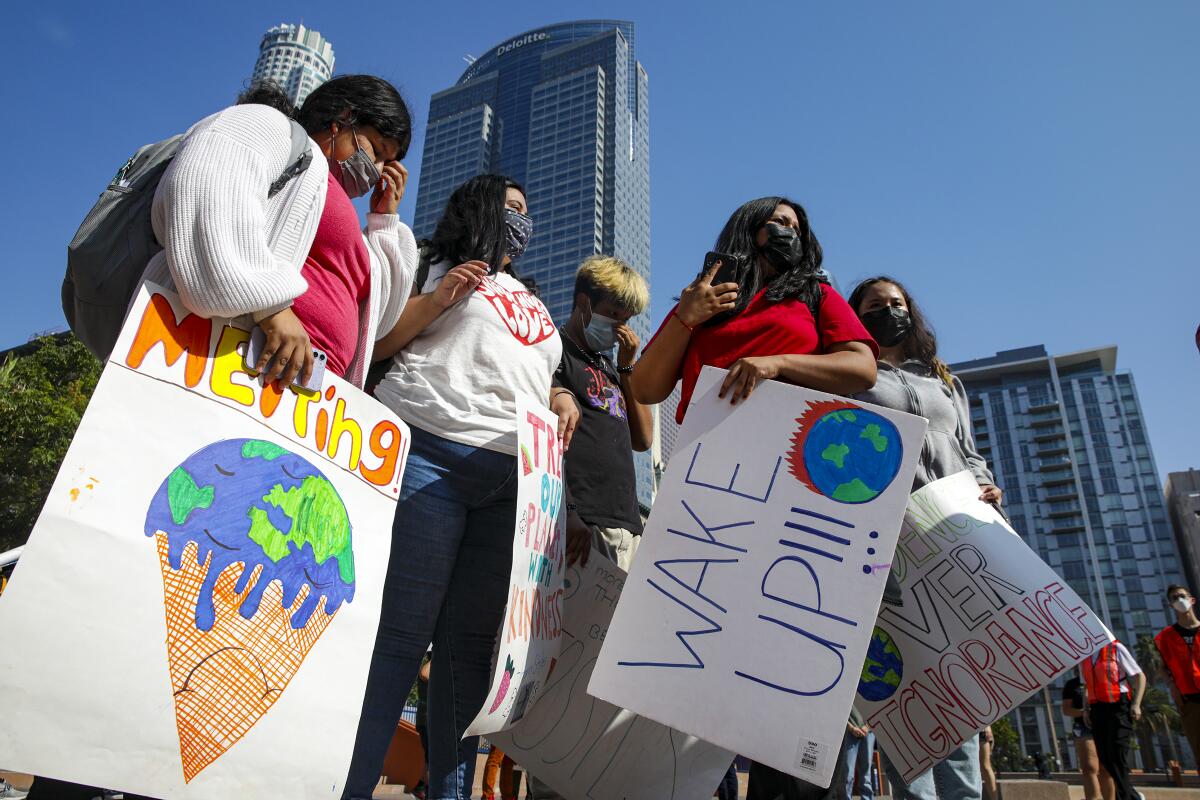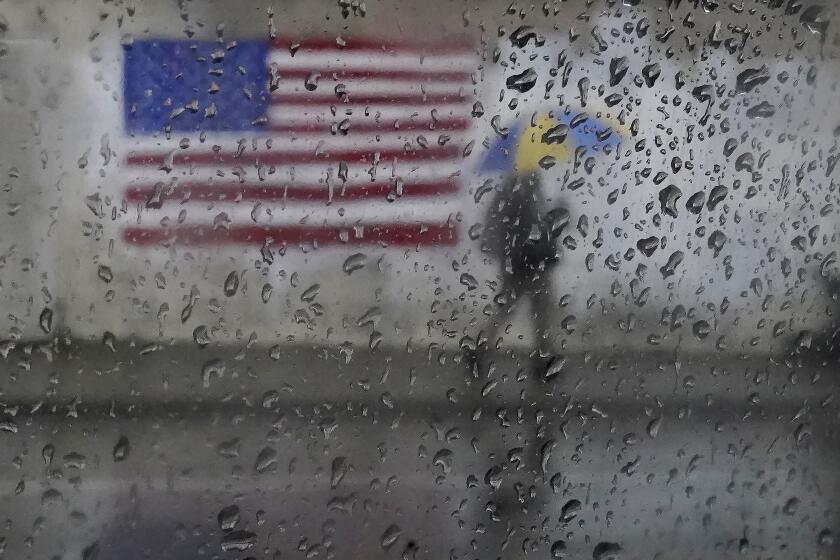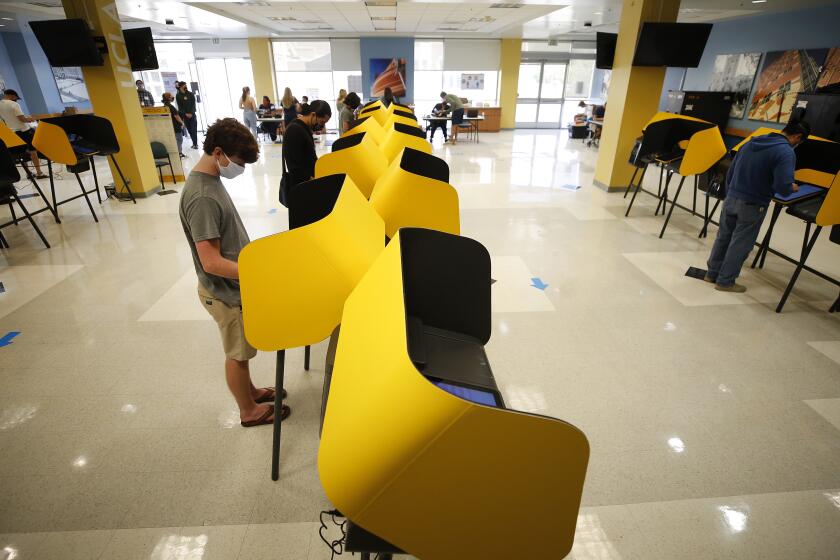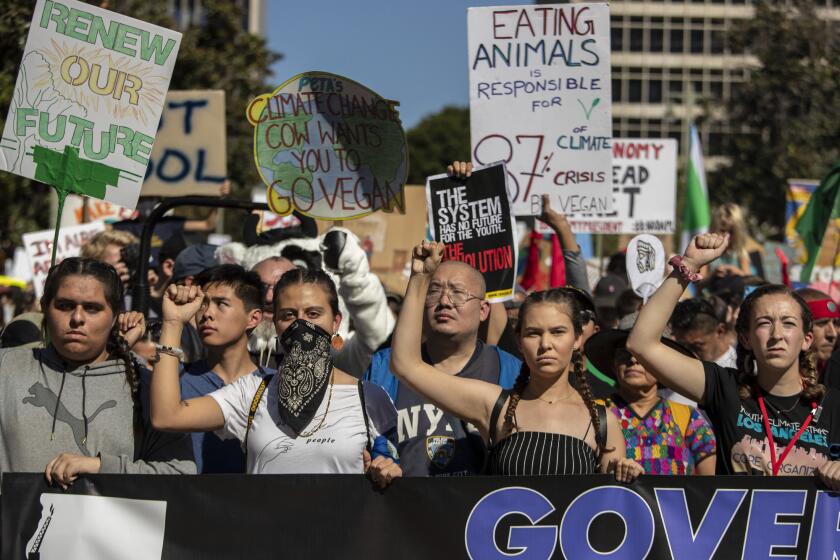Gen Z has good reason to be angry. Will they burn it all down?

- Share via
Generation Z seems like a paradox: far more open to diverse viewpoints and compromise than older Americans, but also in some ways more dogmatic.
Will young people extinguish the flames of political polarization or fan them? As their values clash with those of the oldest generations hoarding power, the fires of extremism crackle louder and expand.
It’s impossible to predict what 69 million Gen Zers will do. But it doesn’t take a crystal ball to see that as the arsonist GOP elders double down, young people will be more inclined to burn things, too.
Opinion Columnist
Jean Guerrero
Jean Guerrero is the author, most recently, of “Hatemonger: Stephen Miller, Donald Trump and the White Nationalist Agenda.”
Still, there’s hope. Gen Zers can negotiate differences better than perhaps any prior generation; some call them Plurals because of their pluralist nature. They’re the most racially and ethnically diverse voters. They’re more likely to identify as LGBTQ: 20% of them, compared with 11% of millennials and only 3% among older people. They’re averse to binaries, be it man-vs.-woman or citizen-vs.-illegal. A quarter are Latinx. They’re less likely to be immigrants than millennials, but more likely to be children of immigrants — cross-border in culture and identity.
They’re digital natives, born between 1997 and 2012, when surfing the Web was already mainstream. They prefer TikTok to TV. Liberal-vs.-conservative cable news pundits are a bore next to social media’s multiverse of raw commentary. Social media’s negative impact has been greater on this group than any other. Depression, anxiety and feelings of loneliness — made worse by the pandemic — are big challenges. Yet many Gen Zers are demonstrating a remarkable resilience, channeling their sense of unease into advocacy for the most vulnerable.
Republicans and Democrats view each other as threats. But labeling our fellow Americans won’t help our country.
They share millennials’ progressive ideas on social issues, but are more likely to support radical policies, such as reparations for descendants of enslaved people. They’re more likely to believe the government should do more to help people. They believe in advocating for the Other, except when the Other is a bully.
“You either have sensitivity to people or you don’t,” Mariah Allen, an 18-year-old Black student at Loyola Marymount University, told me ahead of her class on Bad Bunny’s activism. “If you don’t, you’re kind of being excluded.”
Like other Gen Zers, Allen grew up on stories about teenagers rebelling against oppressive governments, from Hunger Games to the Divergent series. Perhaps that’s why they’re more politically engaged than millennials were at their age. While millennials came of age on Harry Potter’s lessons of a community’s importance, Gen Zers immersed themselves in worlds of uprisings. “We’ve been reading political commentary since like middle school,” she said.
Only 10% of college students think the GOP is moving in the right direction, and just 18% say that’s true of the Democrats.
In last year’s midterm elections, Gen Zers helped Democrats win in nearly every battleground statewide race and grew the Democrats’ majority in the U.S. Senate. They were key to President Biden’s 2020 victory despite their qualms about him. Even though they’re more likely than older generations to be disillusioned with both political parties, they vote.
“If we don’t vote, nothing’s going to change,” Ethan “E” Carter, an 18-year-old Latino classmate of Allen’s, told me. “Incremental change over radical change must be prioritized ‘cause it’s better than no change.”
They’re pragmatic progressives who see too much at stake for an all-or-nothing approach. “They won’t compromise their values, but they’re not afraid to compromise on the perfect solution in order to make progress,” John Della Volpe, polling director at the Harvard Kennedy School of Politics, told me.
Yet, they’ve been vilified as anti-American. They’re less likely than older people to say that the U.S. is better than all other countries, but the unpatriotic label is unfair given their civic engagement. They care about the country. They value the diverse reality of who Americans are; they’re not interested in preserving an America that’s monolithic in culture or politics.
The youngest generation — despite living through shattering national crises — seems to have come into adulthood more resilient and more engaged.
The election of Donald Trump was a turning point for these young adults, akin to the 9/11 terrorist attacks for millennials. Gen Zers realized as kids that American exceptionalism was a lie. As immigration enforcement deported their parents and police tear gassed them at racial justice protests during a pandemic, many had a sense of déja vu for the dystopian teen dramas they once read. They were prepared.
They turned out to vote and deployed their social media accounts as political weapons. They used TikTok to sink a Trump rally and Olivia Julianna, a 19-year-old in Texas, trolled Rep. Matt Gaetz (R-Fla.) and used his name to raise $2 million for abortion funds. Some experts warn of a revolution brewing within Gen Z. But they aren’t destroyers; they’re coalition builders.
Generations come in cycles: an ideological generation like the Boomers; a reactive one like Gen Xers who reject fanaticism; a civic-minded one like millennials who want to help the community; followed by an adaptive one that finishes what the civic one started.
“That’s what Plurals are,” Morley Winograd, a longtime expert on young voters and generational change, told me. “They’re kind of millennials on steroids. They’ve not only learned to negotiate, live and succeed in a pluralistic, non-majoritarian world, but they’re not tolerant of people who want to go back to the days of dominance by one group.”
In Los Angeles, a younger City Council is already demonstrating some of those qualities — pragmatism and less interest in labels and division. They’re focusing on renters and public transportation. In the Council District 6 special election on April 4, all seven candidates are younger than 40 and reject the zero-sum politics of former Councilwoman Nury Martinez, who resigned after making racist comments. “I’m not a mean girl,” candidate Marisa Alcaraz, 35, told me. She’s inspired by Selena Gomez’s “Kill ‘Em With Kindness,” a worthy theme song for Gen Z.
Of course, not everyone agrees about this generation’s spirit of inclusiveness.
In her forthcoming book “Generations,” Jean Twenge, a psychology professor at San Diego State University, argues that Gen Z is becoming more extreme and intolerant. “Gen Z has gone the way of older generations, increasingly moving to the poles of political belief, but they are doing so sooner in life,” she writes.
She cites a survey by Monitoring the Future showing a rise in the percentage of 12th-graders who identify at the extremes of political ideology. The share of those who identify as “very conservative” doubled from 4% nearly four decades ago to 8% today. Those who identify as “very liberal” or “radical” rose from 9% to 16%.
And there is cause for worry, as seen on some college campuses with students shouting down political opponents and controversial speakers — a tactic that tends to strengthen the other side’s extremism. But the youngest voters’ openness to compromise at the ballot box should temper such concerns.
Generations move like murmurations, with every individual shaping the trajectory of the mass by swaying their closest neighbors. Every Gen Zer has the power to change the course of their peers. Every conversation counts.
Bianca Valentín, a 21-year-old student at Loyola Marymount University, recalls that in her first year in high school, her class was a microcosm of polarization. Some students were devastated by Trump’s election; others were dismissive of that reaction. It led to a lot of fighting. The administration sent concerned letters to parents.
“As I got older, the same girls who were telling me not to cry that Trump was elected then became very liberal,” Valentín recalls. She attributes the change to conversations students had in person and on social media. The teens shared videos and other content about how policies were affecting them and built political empathy. “We all got to the root of like, ‘OK, we’re all human beings,’” she said.
Getting past polarization affects their electoral choices. Many Republicans, particularly older ones, see Gen Zers as impinging on their political power. Young people’s fluidity with identity may be foreign to them, but they will have to contend with it. Although most white Americans older than 30 voted Republican in the midterm elections, 58% of whites under age 30 voted for Democratic House candidates.
At the same time, younger Republicans are becoming more socially liberal than their parents. A full 54% of those under age 45 believe America’s openness to immigrants is essential, while only a third of those older than 45 think so, according to an analysis of October 2022 Pew Research data by Michael Hais, who co-authored three books with Winograd.
Gen Z Republicans are more likely than their older counterparts to acknowledge that Black people are treated less fairly than whites today: 43% say this, compared with 30% of Republican millennials and 20% of Republican Gen Xers.
By contrast, among Democrats of all ages, views on social issues are aligning. “It’s really the Republicans who are more divided at this point,” Hais told me. There is a widening generational rupture on the right as youths of all backgrounds learn to co-exist and care about one another. “Younger people are more willing to work together across a variety of lines: age, generation, party, race,” he said.
Gen Zers and millennials will represent nearly 40% of votes in the 2024 election. Millennials are the first generation that hasn’t become more conservative with age, and Gen Zers are following in their progressive footsteps.
The GOP’s future, whether it accepts the reality or not, will depend on winning over this generation. As long as Gen Zers fight apathy and cynicism about politics, they may come to wield far more power than they think they have.
More to Read
A cure for the common opinion
Get thought-provoking perspectives with our weekly newsletter.
You may occasionally receive promotional content from the Los Angeles Times.














